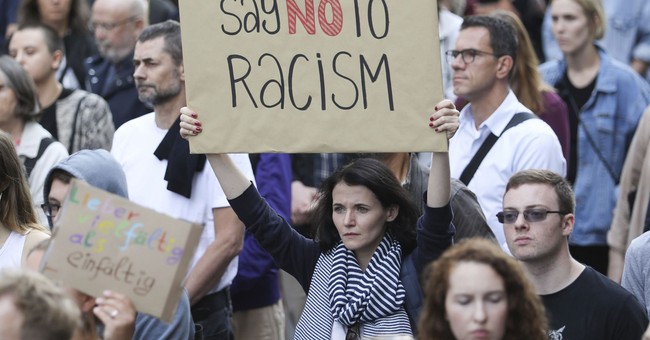
Minnesota is pushing for exams in schools, but not the kind you’d assume.
In a video published Alpha News, Hopkins Public Schools Superintendent Rhoda Mhiripiri-Reed recently welcomed staff back to the ol’ grind.
But 2020’s not your typical year, and Rhoda had an unusual message for those returning from that great American retreat known as summer vacation/zombie apocalypse/murderous riots.
To get everyone ready for the new year, the superintendent pointed out we’re currently suffering two gargantuan infectious epidemics: the coronavirus and rampant racism.
Here’s how she opened:
“In our communications to staff and families, we have referenced a dual pandemic. Mr. George Floyd – rest in power – is seemingly the contemporary face of the pandemic of racial injustice.”
Rhoda confirmed the existence of that as-of-late ubiquitously affirmed scourge, to which no one appears to be pinpointing any specific instances of — systemic racism.
And she pointed out it’s nothing new:
“This pandemic of systemic racism has soiled this country, not just since slavery, but since the genocide of the Native Americans and the American Indians who resided on and cared for this land.”
Sounds like a real feel good “Welcome Back.”
Oh, and Rhoda explained the U.S. system is one of white supremacy:
“We need to examine the role that whiteness plays in our macro-system of white supremacy.”
So whose job it is to fix things? Everyone who isn’t anyone who’s not white:
“[It’s not the] responsibility of people of color to fix racism, or to explain to white people how not to be racist.”
To hear Rhoda tell it, whether you realize it or not, every moment of your existence is ensconced in racism the way George Costanza loves to be ensconced in velvet:
“Without blame or shame, we must recognize that we were conditioned to operate within a system of racism that pervades throughout every aspect of our daily existence. Yet each of us still has the responsibility to engage in self-education and self-analysis.”
So if you’re a teacher, how have you “reinforced a racist policy”? As reported by The Daily Caller, Rhoda wanted to know.
She told staff to “examine” their “racist beliefs.”
She’s done so herself, having “recognized the privilege of being light-skinned, well-educated, and being in a role that is given formal authority.”
So here’s the assignment — if you’re Caucasian, compute your fluke:
“If you are white and/or if you are privileged in another way, I ask you to engage in the same self-analysis to see your own privilege and to examine your whiteness.”
Rhoda wants everyone to take a “journey that begins with self-reflection” in order to become anti-racist.
And what, exactly, is anti-racist? Well, it isn’t simply not being racist.
In June, CNN served up a crash course:
Being anti-racist means more than ridding yourself of racist attitudes, beliefs and behaviors. It means you’re also actively fighting that reprehensible trinity as it manifests in your life on a daily basis.
Donating to activist organizations and protesting injustices are definitely good starts to becoming an ally. But that’s not enough. Actively rebutting prejudices in your own circles is key to lasting change, as those ideas and beliefs — unless challenged — are what our children absorb and are woven into the fabric of our culture.
…Some white people know that to become anti-racist, they must start to listen and brush up on the history of racism in their countries.
Some people are describing obviously racist behavior as the the tip of the iceberg — calling people racist names or threatening people on the basis of race. Then there’s the part of the iceberg that’s not easily visible to people if they’re not looking. This includes a range of subtle but insidious attitudes, behaviors and policies.
Among these are microaggressions. They are brief and commonplace verbal, behavioral or environmental indignities, Tatum said.
Microaggressions can be intentional, unintentional or even well-meaning, but they communicate hostile, derogatory or negative racial assumptions to the receiver. And they have an insidious effect on a black person’s psyche and continuing racist assumptions.
Three such microaggressions:
- “Don’t blame me. I never owned slaves.”
- “All lives matter.”
- “I’m colorblind; I don’t care if you’re white, black, yellow, green or purple.”
Back to Minnesota, the Caller notes Hopkins Public Schools isn’t much of an anomaly:
Numerous public schools across the country have initiated similar “anti-racism” efforts. In 2019, the Seattle Public Schools Ethnic Studies Advisory Committee (ESAC) released a rough draft of notes for its Math Ethnic Studies framework which attempts to connect math to a history of oppression, suggesting that math is subjective and racist.
“Who gets to say if an answer is right,” the committee suggest under one question, and under another, “how is math manipulated to allow inequality and oppression to persist?”
So they’re ya go.
But I’ll give contemporary education one thing: They may no longer subscribe to math or science or history or objectivity or grades or meritocracy…but at least they’re teaching philosophy.
-ALEX
Find all my RedState work here.
And please follow Alex Parker on Twitter and Facebook.
Thank you for reading! Please sound off in the Comments section below.




